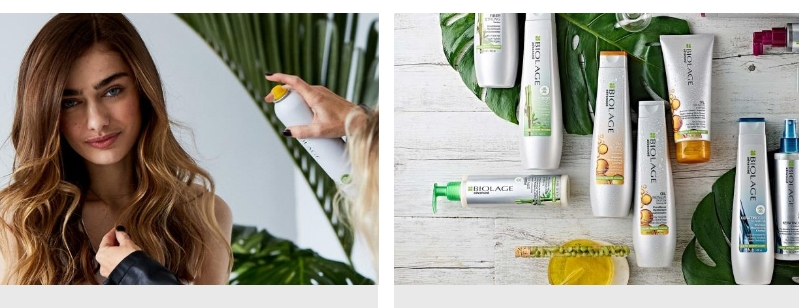
biolage haircare products; @biolage.com
Each year about 5.5bn plastic bottles are sent to landfill or incinerated in the UK. And while 90% of kitchen packaging is put into recycling, we recycle only about half of our bathroom packaging, which includes shampoo and conditioner bottles.
Some brands are proactive both in tackling this and addressing their own wasteful practices. Aveda arguably represents the gold standard when it comes to haircare brand sustainability. It was the first beauty company to use 100% recycled plastic, and more than 85% of its bottles and jars are made entirely from post-consumer recycled materials (soon, all of them will be, and it’s investing heavily in plastic alternatives). The products themselves are made using 100% solar and wind power, and most of their manufacturing waste is recycled or reused. Nothing in Aveda’s haircare line contains sulphates, parabens, mineral oil, paraffin, formaldehyde and heaps of other things I don’t have space to list. Starting next month, all Aveda’s haircare will be vegan (though naturally, everything this week is cruelty free and not sold in mainland China where animal testing is currently mandatory).
I could go on, but what people will want to know is what’s worth buying. I’ve loved Shampure, a glorious-smelling, shine-imparting shampoo and conditioner for all hair types (£15.50 and £17.50 for 250ml respectively), since it launched in the 1990s, but feel slightly put out that Aveda’s Cherry Almond shampoo (£15.50 for 250ml) and conditioner (£17.50, 200ml) are wrong for my fine hair; thicker, drier types can enjoy its delicious (and natural) cherry bakewell aroma and rich, luxurious texture.
Biolage’s products are made in either a “dry factory” (where all industrial water is purified and reused), or another running on 100% renewable energy, with zero waste sent to landfill. Their HydraSource shampoo and conditioner (both £11.95 for 250ml and 200ml respectively) are wonderful on dehydrated hair of any thickness and texture, but their new R.A.W. range will appeal to young people (the products look and smell like smoothies). At least 85% (often 100%) of packaging on Biolage products is post-consumer recycled.
British brand Lush aims to banish packaging altogether. Its first packaging-less UK store opened in Manchester this January, selling its solid, easy-to-use shampoo bars. I love the New bar (£8, 55g), with cinnamon and peppermint, for these warmer months – cooling, invigorating and satisfyingly sudsy (I didn’t need a conditioner).
Cynics will reasonably point out that Lush is a huge global concern, Aveda is owned by Estée Lauder Companies, Biolage by L’Oréal. But I take the view that, given the scale of the plastics problem, significant change is impossible without engaging with big business’s more ethical decisions. I’m all for supporting small, independent, local companies. But I’m also a realist, and agree with an expert at a recent conference I attended, who, in response to criticism of big corporations’ sustainability efforts, said: “We don’t have time to do everything and be everything. Time is running out. It is too late for perfect.” He’s right. Perfection is the enemy of progress, but it’s not to late to do better.
guardian.co.uk © Guardian News & Media Limited 2010
Published via the Guardian News Feed plugin for WordPress.

